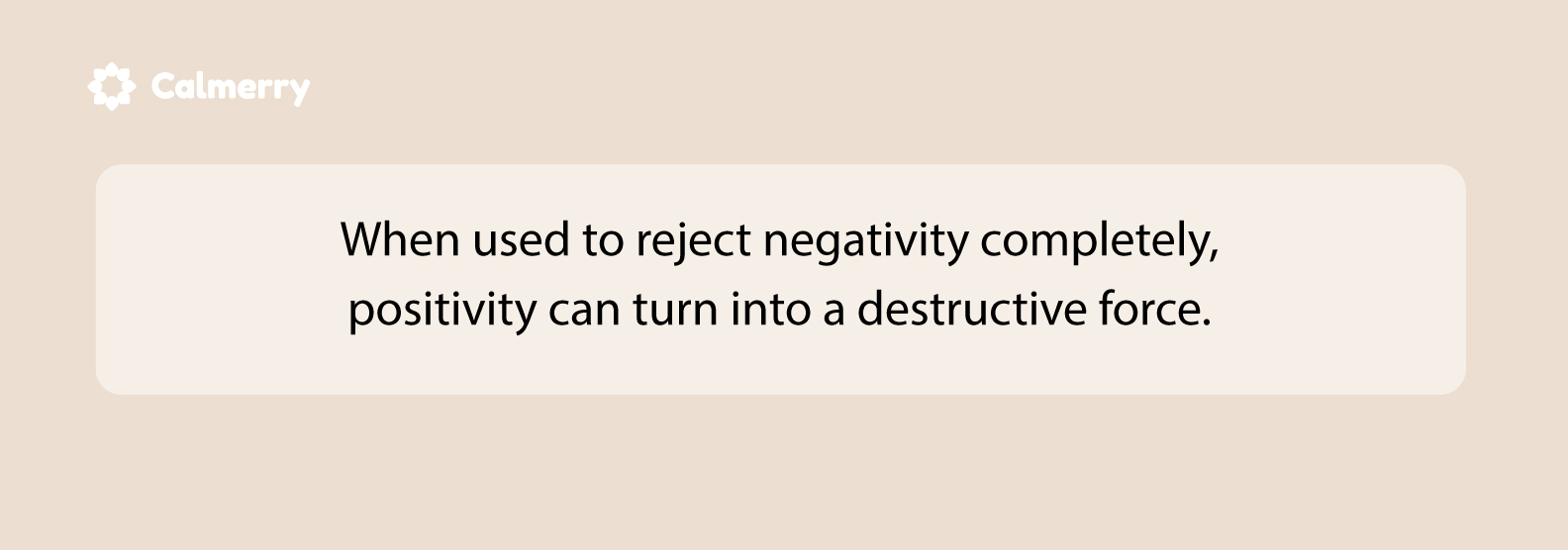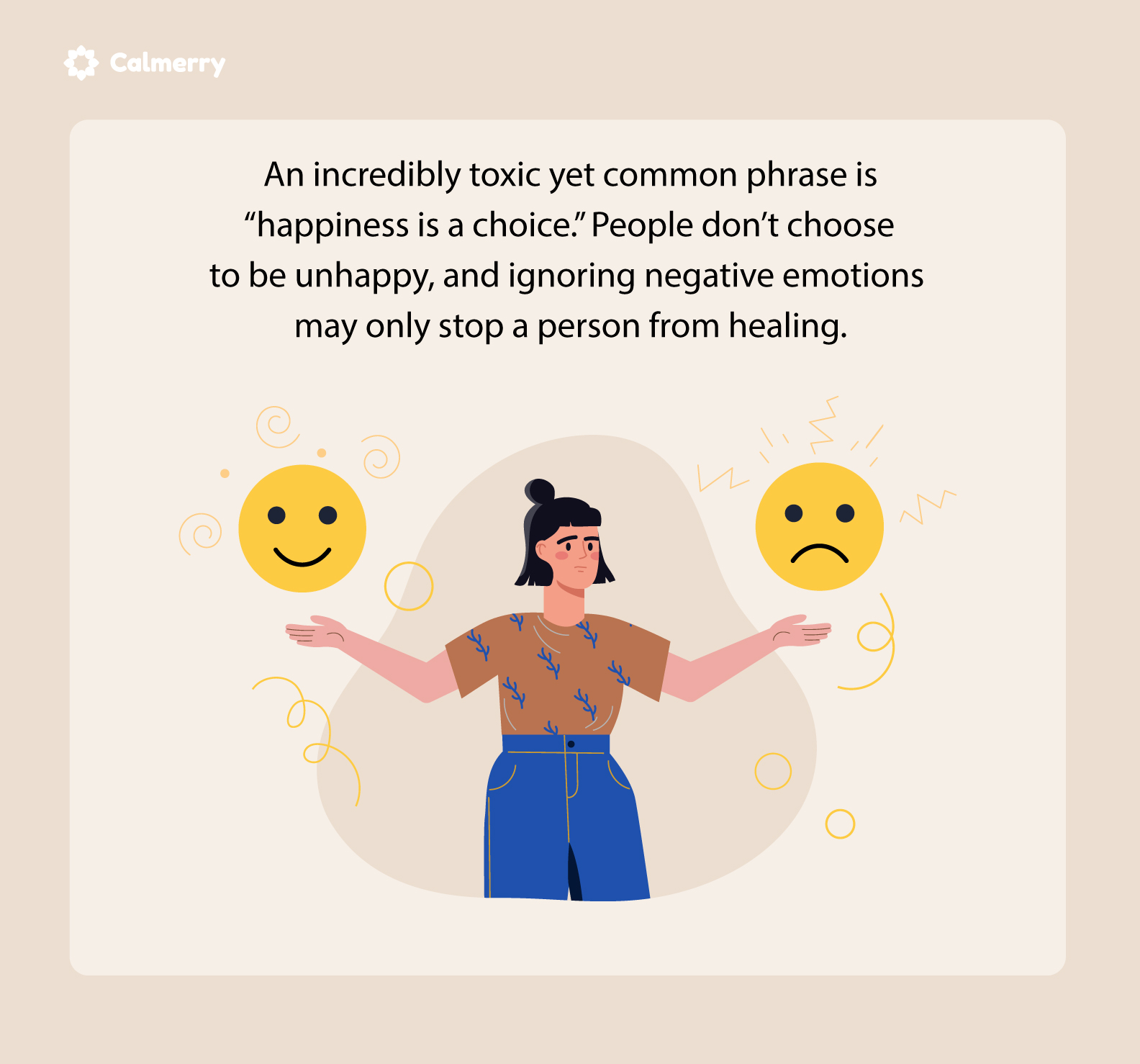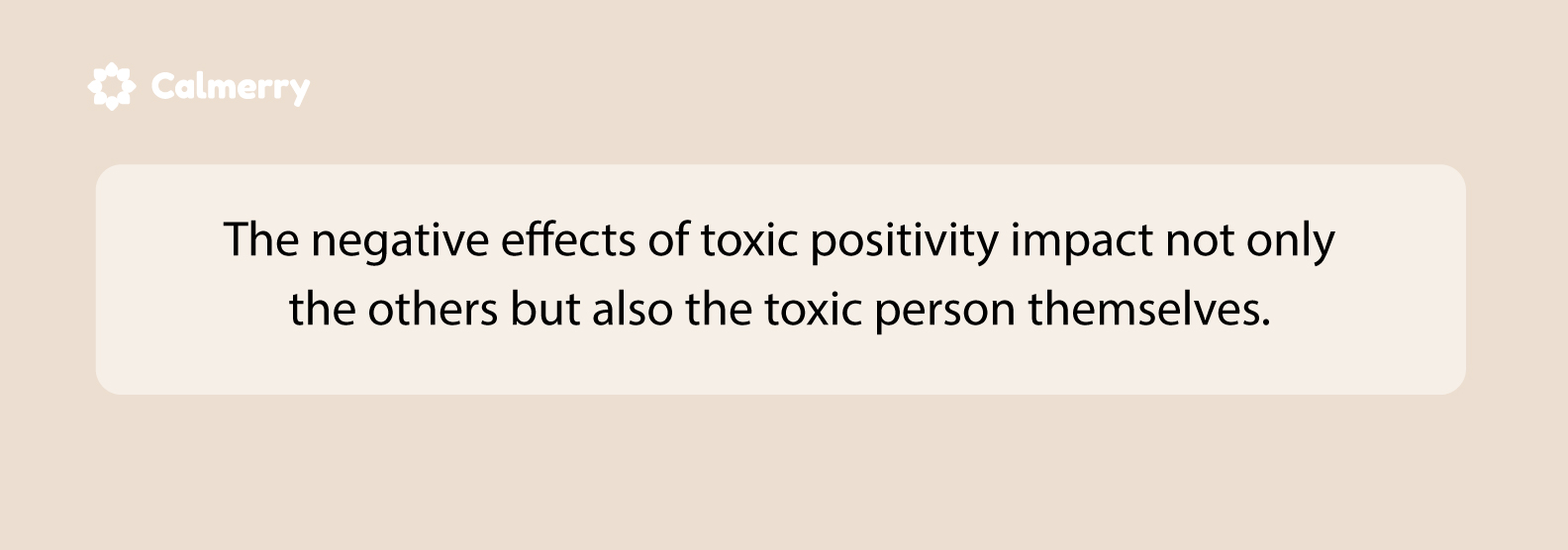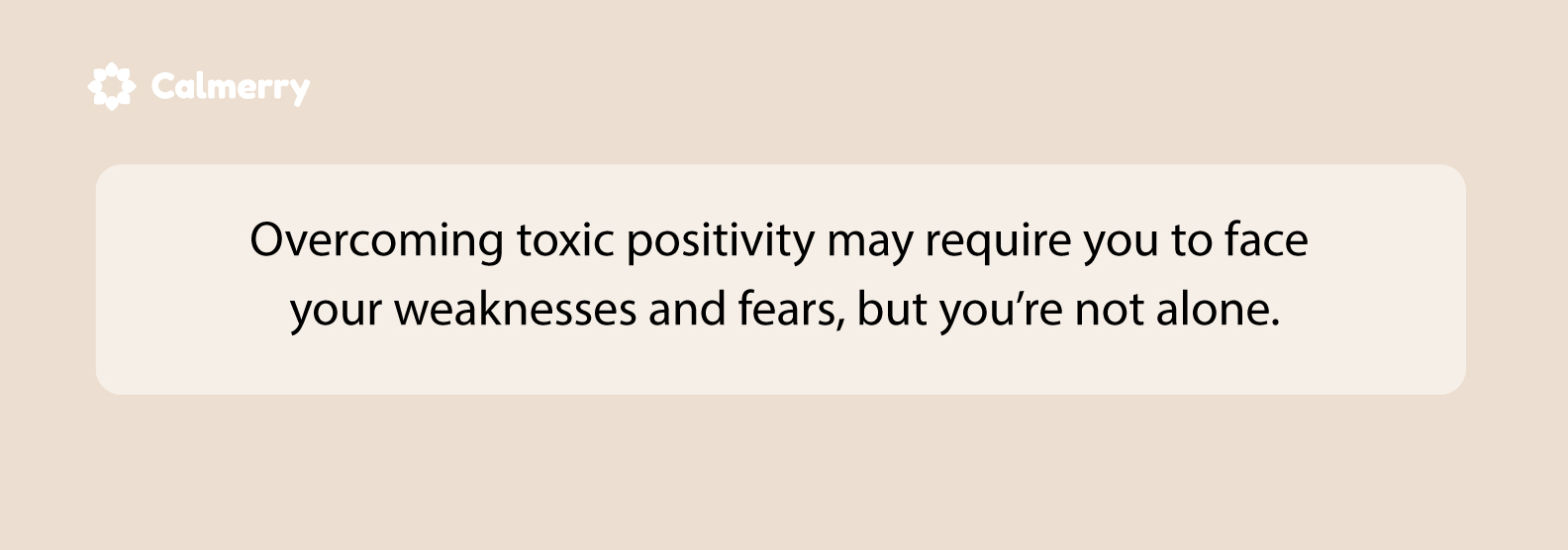Toxic Positivity: What It Is and What to Do About It

In this article
Sometimes, when we feel sad, frustrated, or overwhelmed, it can be so good to just hear someone say: “Don’t worry, everything will be alright.”
When negative thoughts and emotions start to impact your motivation and well-being, it can be really helpful to focus on positive aspects of things and “good vibes.”
Hearing reassuring words from others may help you cope with sadness or anxiety.
So, being positive is always good, right? Well, not exactly.
Drinking water is also good for you, but did you know one can die from drinking 5+ liters of water? Many things are only good if used in moderation, and positivity is no different.
While helpful or necessary in some situations, positivity can also be toxic. In this article, we’ll shed some light on the toxic positivity concept, which might seem somewhat illogical.
When positivity goes wrong: what is toxic positivity?
Toxic positivity is the belief that no matter how challenging a situation is, you should maintain a positive mindset and only express positive thoughts and emotions.
While having a positive outlook is generally beneficial, toxic positivity takes it to an extreme. It denies the validity of genuine human emotions like sadness, anger, or frustration.
In many situations, positive thinking can be helpful. For instance, it can help stop negative self-talk.
Toxic positivity, however, implies a denial or suppression of emotions. For example, a person may criticize someone else’s sadness and insist on positive thinking.
The constant denial of negative feelings may cause more harm than good, not letting you process your emotions and making it difficult for you to cope with stress.
Besides, denying other people’s emotions is one of the common signs of toxic relationships.
What are the causes of toxic positivity?
Toxic positivity is a defense mechanism. At its core, it often stems from a fear of confronting our own or others’ emotional pain. It can be a way to avoid dealing with the discomfort of facing challenging feelings or situations.
By focusing solely on the positive, we may think we’re protecting ourselves or others from the weight of difficult emotions.
– Kate Skurat, Former Clinical Product Manager at Calmerry
Some factors that can contribute to the roots of toxic positivity include:
- Cultural conditioning. Society often places a high value on happiness and positivity. This can lead to pressure to always appear happy and optimistic, even when struggling.
- Personal history. If someone has experienced trauma, loss, or adversity, they may adopt toxic positivity as a coping mechanism to avoid dealing with the pain of their past experiences.
- Discomfort with vulnerability. Expressing negative emotions can make us feel vulnerable and exposed. Toxic positivity can be a way to avoid this vulnerability and maintain a sense of control.
- Lack of emotional coping skills. If someone hasn’t learned healthy ways to process and express their emotions, they may resort to toxic positivity as a default response.
Toxic positivity vs. genuine optimism
There’s nothing wrong with trying to stay positive — optimism and positive thoughts are extremely valuable when it comes to balancing negativity. However, that doesn’t mean refusing to see negativity altogether.

Optimism is all about appreciating the positive sides of things and anticipating positive outcomes. Research data shows that optimism can make people more stress-resilient and improve their overall mental well-being.
Numerous studies show that turning negative into positive, known as positive framing, can help reduce anxiety and boost mood. Optimism and positive framing are often used as coping mechanisms, so it’s important to understand the difference between optimism and toxic positivity.
Toxic positivity isn’t about recognizing the positive things but denying the negative ones. Sometimes, such an attitude can cause a lot of harm, especially when positivity is forced onto people who experience grief, trauma, depression, or deal with other mental health issues.
View this post on Instagram
Signs of toxic positivity
Everyone is different, so toxic positivity may take different forms from person to person.
However, there are some particularly common things associated with toxic positivity:
- Dismissing negative feelings and thoughts.
- Hiding personal feelings.
- Getting irritated by people who are in a bad mood or share their problems.
- Shaming others for showing their weaknesses and vulnerabilities.
- Using comparison phrases like “it could be worse,” “just don’t think about it,” etc.
- Feeling guilty for experiencing negative emotions.
- Offering unsolicited, simplistic advice to others who are struggling, such as “just be positive” or “look on the bright side,” without truly listening to or acknowledging their feelings.
- Avoiding conversations that involve heavy or serious topics, preferring to keep things light and superficial
- Presenting an overly idealized life on social media.
- Using spiritual or philosophical beliefs to avoid dealing with uncomfortable emotions or situations, like, “everything happens for a reason” in response to someone’s pain.
- Downplaying the severity of someone’s struggles: like telling someone with depression to “just cheer up” or “snap out of it.”
- Pressuring others to maintain a positive attitude, even when it’s not authentic or appropriate for the situation.
Toxic positivity examples
Scenario 1
Someone loses their job and feels stressed and anxious about their future. A friend responds, “Don’t worry –everything happens for a reason! Just stay positive, and something better will come along.“
Why it’s toxic: This response dismisses the person’s valid concerns and suggests that their feelings of stress and anxiety are unwarranted. It places pressure on them to “stay positive” rather than acknowledging the real challenges they’re facing.
Scenario 2
Someone confides in a friend about their struggles with depression. The friend replies, “You just need to focus on the good things in your life. Others have it so much worse than you.“
Why it’s toxic: This minimizes the person’s experience with depression and implies that they shouldn’t feel the way they do because others have it worse. It also suggests that simply focusing on positive things will cure their depression. This is an oversimplification of mental health.
Scenario 3
After a difficult breakup, someone expresses their heartbreak on social media. They receive comments like, “Don’t be sad! You’re better off without them. Just keep smiling!“
Why it’s toxic: These comments pressure the person to hide their authentic feelings and put on a happy face rather than allowing them to process their grief and heartbreak. It suggests that sadness is not an acceptable emotion to express.
Scenario 4
In a work meeting, an employee raises concerns about a project timeline. The manager responds with, “Let’s not focus on the negatives. We need to maintain a positive attitude and trust that it will all work out.”
Why it’s toxic: This dismisses the employee’s valid concerns and their limits. It suggests that expressing anything other than positivity is unproductive. It can lead to important issues being ignored or brushed aside.

Is toxic positivity gaslighting?
Toxic positivity may also turn into a form of gaslighting. It can be incredibly helpful to look on the bright side of challenging situations, but when taken too far, such a positive spin can become emotionally manipulative and isolating.
People often use toxic positivity to isolate themselves from other people’s negative feelings and experiences so they may persuade others that all of their problems are just made up. So, it can be an unhealthy coping mechanism when people downplay and invalidate another’s emotions as a method of avoiding painful feelings.
Under the guise of optimistic thinking, individuals may attempt to coerce, manipulate, or shame someone into staying positive, even when it relates to deeply painful topics. This could be damaging.
When people believe that their issues aren’t serious, exaggerated, shameful, or don’t exist altogether, it can prevent them from healing and seeking out the help they need. They start internalizing the belief that there’s something wrong with them if they feel the way they feel.
– Kate Skurat, Former Clinical Product Manager at Calmerry
The impact of toxic positivity on mental health
Toxic positivity can deal a lot of emotional damage when used against people who go through hard times.
Sharing genuine emotions and showing one’s vulnerabilities can be quite difficult by itself. And receiving toxic positivity in response can make a person feel invalidated and dismissed.
When facing a struggle, people feel the need for emotional validation. They need support from others, and toxic positivity makes them feel like their natural feelings are unacceptable, causing shame and guilt.

As an avoidance mechanism, toxic positivity seems to offer an escape from any uncomfortable emotional situation. However, by sticking to toxic positivity, people also apply the same thinking to themselves, denying their own negative emotions and feeling ashamed of them.
Attempting to stay perpetually upbeat and cover up any negative feelings can lead to emotional repression. It leaves us feeling disconnected from our authentic selves and unable to process difficult experiences properly.
It can also create a cycle of disconnection and isolation when we don’t feel understood or supported in our true emotions.
And let’s not forget that personal growth is impossible without encountering situations that might make you feel uncomfortable, frustrated, or sad.
You won’t be able to learn from negative experiences without facing and processing your negative emotions.
– Kate Skurat, Former Clinical Product Manager at Calmerry
How to deal with toxic positivity
Perhaps, one of the main problems with toxic positivity is that it destroys empathy and safety. By dismissing negative emotions, toxic people devalue and reject other people’s feelings. As a result, toxic positivity can lead to abusive relationships, bullying, and shaming.
Sometimes, it can be easy to resort to toxic positivity when you don’t know what to say to a person who’s struggling with negative emotions. Although some positive phrases might help, it’s also important to acknowledge and validate the other person’s feelings.
Here are some tips that might help you deal with toxic positivity from other people and overcome it in yourself.
1. Recognize toxic thinking
Toxic positivity is all about oversimplification and generalization.
“Choose to be happy,” “good vibes only,” “just think positively” – all such messages are too simple, and real life isn’t. While emphasizing positive emotions can be a good practice, it’s important not to dismiss other emotions.
So, don’t hesitate to point this out.
2. Don’t ignore your emotions
Acknowledging unpleasant emotions is the first and most important step toward overcoming toxic positivity.
It can be difficult to face your fears, insecurities, and vulnerabilities. However, avoiding these things will prevent you from tackling the problems that cause them and, therefore, from growing.
A great way to face your emotions is to talk about them or write them down. According to a study by UCLA, shaping your feelings into words can help reduce the intensity of negative feelings, including pain, anger, and sadness.
Online counseling on Calmerry will allow you to talk about your feelings with licensed mental health professionals. You will better understand your emotions and the causes behind them. Besides, a counselor can suggest effective coping practices that work for you.
3. Validate all emotions
One of the key steps in countering toxic positivity is to create a space where all emotions are validated and accepted. This means acknowledging that it’s normal and healthy to experience a wide range of feelings, including uncomfortable or difficult ones.
When someone expresses a negative emotion, instead of immediately trying to shift their perspective or “cheer them up,” try responding with empathy and understanding.
You can say things like, “That sounds really tough,” “It’s understandable to feel that way,” or simply, “I’m here to listen if you need to talk.“
By validating their emotions, you’re sending the message that it’s okay not to be okay and they don’t need to hide or suppress their authentic feelings.
4. Be realistic about your feelings
There’s nothing wrong with trying to stay positive no matter what. However, you should also be realistic and accept the fact that it’s completely normal to feel upset, afraid, or stressed in certain situations.
Don’t expect that you or someone else will stay positive when going through hard times. Instead, think of the fact that negative emotions won’t last forever and focus on self-care.
5. Embrace the complexity of emotions
People can be sad yet hopeful, worried yet excited, etc. Emotions can be quite complex, and there’s nothing wrong with having mixed emotions about something. The more complex the situation, the more complex the emotions can be.
6. Model emotional authenticity
Finally, one of the best ways to counter toxic positivity is to model emotional authenticity yourself.
This means being honest about your own struggles and challenges and not feeling pressured to maintain a façade of constant positivity.
By showing vulnerability and sharing your own authentic experiences, you create a culture where it’s okay to be human, flaws and all. This can encourage others to do the same and build more genuine connections.
– Kate Skurat, Former Clinical Product Manager at Calmerry
How therapy can help with toxic positivity
Toxic positivity is a defensive strategy that doesn’t really help. By pretending there’s no place for negativity in our lives, we may only suppress our natural negative feelings, unable to process them and heal.

Here are some ways therapy can help:
- A therapist can provide a safe, supportive space where you can express your feelings without fear of judgment or dismissal.
- You can explore how toxic positivity has affected your self-esteem, relationships, and overall well-being.
- The therapist can help you process any feelings of guilt, shame, or self-doubt that may have arisen from these experiences.
- Victims of toxic positivity may struggle to set boundaries or express their needs and feelings to others. Therapy can help you develop assertiveness skills and learn how to communicate your emotions and needs clearly and confidently.
- A therapist can help you recognize instances of toxic positivity in your own thoughts, behaviors, and interactions with others. They can help you understand how these patterns may impact your mental health and relationships.
- Through therapy, you can delve into the underlying reasons behind your tendency towards toxic positivity.
- Therapy provides a space to practice vulnerability and authentic self-expression. As you become more comfortable sharing your true thoughts and feelings in therapy, you may find it easier to do so in other areas of your life.
If you’re ready, we will connect you with your online therapist within 1 hour. You deserve to feel all your feelings and get genuine support.
online therapy
live video session


